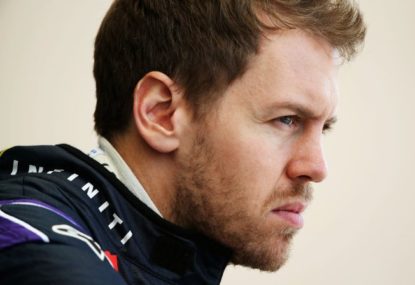Love him or loathe him, there is no escaping the fact that it was largely by the hand of Bernie Ecclestone that Formula One turned into the internationally popular racing series it is today.
When once Formula One denoted little more than a specification for open wheel racing entered into by a ragtag bunch of privateer and manufacturer outfits, today it commands a global viewership shaded only by the FIFA World Cup and the Olympic Games.
Much of this lucrative transformation was driven by Ecclestone, who was unafraid to sink his own money into avenues he saw as being ripe for exploitation – and so it is that Formula One wheeled and dealed its way to its modern day successful self.
It is because of this that the Formula One world listens when Bernie speaks – so when the self-styled tsar of the world’s fastest sport says that four-time title winner Sebastian Vettel and title-contending compatriot Nico Rosberg are bad for Formula One, one cannot help but sit up and pay attention.
“From a pure business aspect – sorry Nico if I have to say this – you are not so good for my business,” Ecclestone said in a conversation with Nico Rosberg published on Formula1.com.
“Sebastian (Vettel) is also not doing much for Formula One. People hardly recognise him on the street.”
Harsh words from the veritable grandfather of Formula One, especially considering one man has the unenviable task of keeping a rampant Lewis Hamilton honest, and the other is well on his way to proving himself one of the most prodigious driving talents since Michael Schumacher.
Ecclestone’s reasoning is equally brutal.
“It sounds harder than it is meant,” he admitted, “[but] unfortunately you don’t have the German fans on your side.
“As the cancellation of the German Grand Prix indicates, Germany is a terrible market for Formula One.”
Big claims. And his supporting evidence?
“On the contrary Lewis is a hero in the UK.
“When it comes to Formula One I am a huge Lewis fan because he is a super promoter of the sport. He manages to get to all different walks of life: red carpet, fashion business, and music – you name it.
“I still believe that Lewis is the best champion that we have had in a long, long time.”
This is, after all, a representative of the commercial rights holder speaking, so it is hardly surprising that his argument is grounded in what he believes is best for the promotion of the sport – but is it fair to pin the fortunes of Formula One on but three of its protagonists?
Germany was formerly a Formula One stronghold. At the height of Michael Schumacher’s powers it hosted no fewer than two grands prix – one at Hockenheim and another at the Nurburgring – in competition with a third over the border in Austria.
Last year the Hockenheimring hosted one of its least successful events in modern Formula One history. Barely 50,000 people showed up to see Rosberg win his home race in a manufacturer Mercedes car. This year the German Grand Prix isn’t happening at all.
None of this is surprising – crowds have been dwindling in Germany for years, likewise TV viewing figures. As is Formula One’s way in recent times, finger pointing knows no bounds.
Engines? They don’t address the long-term decline. Prices? German ticket prices have similarly been falling in response to dwindling demand. Television? Free-to-air station RTL still broadcasts all races and qualifying sessions live.
So is it the fault of the drivers? Is it true that in this super-connected world these two drivers have done a poor job of turning themselves into the icons fans supposedly expect sportspeople to be?
Perhaps. On the one hand, Vettel has worked tirelessly to shield his private life from the press and the fans – but that’s exactly the same strategy employed by Michael Schumacher, yet fans still flocked to see him race.
On the other hand, Rosberg has an extensive online presence on every major form of social media, and does a great deal to connect to his fans – who could forget his video blog after the Belgian Grand Prix in which he responded to people who accused of him cheating?
Is it possible both Vettel and Rosberg present images far too whitewashed to truly connect with racing fans? Hamilton, by contrast, presents a no-holds-barred approach to fame. He embraces it with seemingly little regard for PR or PC – does he come across as more ‘real’ than his German rivals?
But maybe – just maybe – Formula One is failing to see the wood for the trees. Drivers with big personalities present the sport with excellent image bonuses, but relying on the drivers to sell the sport on their own is no cleverer than asking them to build the cars themselves.
Promotion? Surely that falls to the promoter, and that title resides with the commercial rights holder, represented by one Bernard Charles Ecclestone. And though he might do, as he tends to do, a fantastic job of dressing up the event – paddock, race track, backdrop, and all – that crucial hard sell has long been absent from the marketing strategy.
Let the racers race and leave the promoter to promote. The show is ready and waiting to be sold, if only someone cared to sell it.





























































































